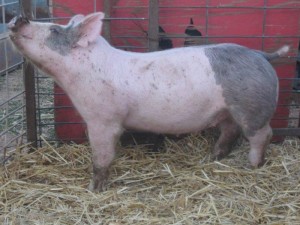Last week, an Indiana trial court upheld the constitutionality of the state’s right to farm statute Amrstrong v. Maxwell Farms of Indiana Inc. [Read opinion here.]
Background
The farm property at issue has been used continuously as a farm since the early 1900’s. Gary Foulke owns the property and the finishing barn sitting upon it. Maxwell Farms began placing hogs in Foulke’s barn in June 2007. Foulke then finished out the hogs, caring for them from the time they weigh approximately 50 pounds until they weigh approximately 260 pounds. Plaintiffs Michael and Connie Armstrong moved into the area in 1985 and Larry and Jette Dugan in 1990.
In 2009, the Armstrongs and Dugans filed suit in Randolph Circuit Court against Folke and Maxwell Farms for nuisance and negligence. The defendants filed a motion for summary judgment seeking to dismiss the nuisance claim pursuant to the Indiana Right to Farm statute. In response, the plaintiffs claimed that the statute was unconstitutional. Defendants also sought to dismiss the negligence claim based on a lack of evidence to prove such claim.
Indiana Right to Farm Statute
Like all other states, Indiana has a right to farm statute that provides a legal defense to agricultural operators against nuisance claims. Indiana’s statute was enacted in 1981 in order to “conserve, protect, and encourage the development and improvement of [Indiana’s] agricultural land for the production of food and other agricultural products” by “limiting the circumstances under which agricultural operations may be deemed to be a nuisance.” [Read Indiana Right to Farm statute here.]
The Indiana statute protects a producer if three conditions are met: (1) the agricultural operation was in operation continuously on the property for at least a year prior to suit being filed; (2) no significant change occurred in the type of agricultural operation (the statute provides that changing from crop to hog production or changing ownership or size of the operation does not constitute a significant change); and (3) the agricultural operation would not have been a nuisance when it began on the property.
Finally, the Indiana Right to Farm statute provides a defense against nuisance claims, but contains an exception for cases where the nuisance results from negligent operations.
The Court’s Opinion
Based upon the rationale below, the Court granted the defendants’ summary judgment motion and dismissed the suit.
Constitutionality of the Right to Farm Statute
The plaintiffs challenged the constitutionality of the Right to Farm statute on numerous grounds including that it constituted a taking of private property, that no plaintiff could recover, violated the privileges and immunities clause, violated equal protection, and was unconstitutionally vague. Because the plaintiffs put forth a facial challenge–meaning the law can never be constitutional–rather than an as-applied challenge–meaning the law is unconstitutional as applied to the facts in this case, their burden was to prove that there were “no circumstances under which the statute can be constitutionally applied.” Further, challengers must overcome a presumption of constitutionality applied to all statutes.
The court rejected the plaintiffs’ taking argument, finding that its prior ruling on this issue in Lindsey v. DeGroot was dispositive and that no taking occurred. Next, the court rejected the argument that no plaintiff could recover under the statute pointing to the nuisance exception that would allow recovery in certain situations. With regards to the privileges and immunities claim, the court found that the legislature had a rational basis for deciding to afford protection to the agricultural industry. As to equal protection, the court found that the statute met the rational basis test as there was a legitimate interest in providing a defense to protect agricultural operations. Finally, as to the vagueness argument, the court found the act clear and consistent particularly with regard to the definition of a “significant change.” Therefore, the Indiana Right to Farm Act is constitutional.
Nuisance Claim
The court found that the defendants met each of the elements of the Right to Farm statute. First, Maxwell farms presented evidence that the farmland at issue and surrounding areas had been in agricultural operation since 1900 and that Maxwell Farms first placed hogs on the property in 2007, more than a year before suit was filed in 2009. Second, although defendants incased the size and scope of the current swine operation, as noted above, that does not constitute a “significant change” under Indiana law. Third, the plaintiffs offered no evidence that the farm constituted a nuisance when it began in the early 1900’s, and the fact that no complaints were made for 2 years after Maxwell began providing hogs to the farmer weigh against the plaintiffs’ argument. Thus, the Indiana Right to Farm statute applies and the case cannot go forward.
Negligence Claim
As noted above, if the defendants were operating in a negligent manner, the Right to Farm Act would not apply. Here, however, the plaintiffs failed to provide any evidence the farmer was negligent. They offered no factual support for their claim and no explanation of how the farmer’s actions were unreasonable.













